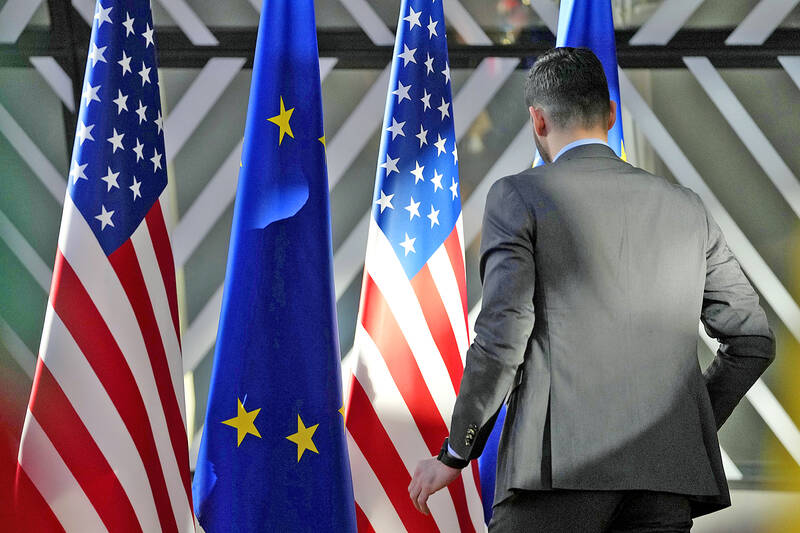The US and EU issued a joint statement on Wednesday supporting Taiwan’s international participation, notably omitting the “one China” policy in a departure from previous similar statements, following high-level talks on China and the Indo-Pacific region.
The statement also urged China to show restraint in the Taiwan Strait.
US Deputy Secretary of State Kurt Campbell and European External Action Service Secretary-General Stefano Sannino cochaired the seventh US-EU Dialogue on China and the sixth US-EU Indo-Pacific Consultations from Monday to Tuesday.

Photo: AP
Since the Indo-Pacific consultations were launched in 2021, references to the “one China” policy have appeared in every statement apart from the one issued on Wednesday and another in April 2022.
In 2021, both sides reaffirmed cooperation with Taiwan while adhering to their respective “one China” policies.
After the policy was omitted in a statement released in April 2022, it was mentioned in December of that year, affirming unchanged positions.
In the latest statement, the US and EU emphasized the need for peace in the Taiwan Strait, rejecting unilateral changes to the “status quo,” particularly through force.
The US and EU stressed the importance of maintaining open communication with China while engaging in fair competition and pursuing diplomacy on common interests and disagreements.
They expressed concern over China’s support for Russia in its war in Ukraine and urged Beijing to uphold international law, stressing that any peace plan must respect sovereignty and territorial integrity.
The two sides also addressed China’s human rights abuses, particularly in Tibet and Xinjiang, and called for cooperation with the UN human rights office.
They pledged to counter China’s transnational repression and raised concerns over the erosion of Hong Kong’s autonomy.
Condemning China’s actions in the East and South China seas, the US and the EU cited the importance of freedom of navigation and the peaceful resolution of disputes, especially regarding the Philippines.
They reaffirmed the 2016 Permanent Court of Arbitration’s ruling at The Hague in favor of the Philippines and against China as binding.
The statement highlighted continued US-EU cooperation on Indo-Pacific security, including joint maritime operations and a roundtable to be held at the US Indo-Pacific Command.
Both sides also reaffirmed the importance of having balanced and fair economic relations with China, and vowed to continue addressing challenges brought by China’s non-market policies and practices.
The US and EU intend to continue derisking by reducing dependencies and vulnerabilities in strategic sectors, the statement said.
Foreign information manipulation is also a continued threat that requires further work with Indo-Pacific partners to build free and resilient information ecosystems, it added.
The next dialogue is to be hosted in Washington next year.

INVESTIGATION: The case is the latest instance of a DPP figure being implicated in an espionage network accused of allegedly leaking information to Chinese intelligence Democratic Progressive Party (DPP) member Ho Jen-chieh (何仁傑) was detained and held incommunicado yesterday on suspicion of spying for China during his tenure as assistant to then-minister of foreign affairs Joseph Wu (吳釗燮). The Taipei District Prosecutors’ Office said Ho was implicated during its investigation into alleged spying activities by former Presidential Office consultant Wu Shang-yu (吳尚雨). Prosecutors said there is reason to believe Ho breached the National Security Act (國家安全法) by leaking classified Ministry of Foreign Affairs information to Chinese intelligence. Following interrogation, prosecutors petitioned the Taipei District Court to detain Ho, citing concerns over potential collusion or tampering of evidence. The

‘FORM OF PROTEST’: The German Institute Taipei said it was ‘shocked’ to see Nazi symbolism used in connection with political aims as it condemned the incident Sung Chien-liang (宋建樑), who led efforts to recall Democratic Progressive Party (DPP) Legislator Lee Kun-cheng (李坤城), was released on bail of NT$80,000 yesterday amid an outcry over a Nazi armband he wore to questioning the night before. Sung arrived at the New Taipei City District Prosecutors’ Office for questioning in a recall petition forgery case on Tuesday night wearing a red armband bearing a swastika, carrying a copy of Adolf Hitler’s Mein Kampf and giving a Nazi salute. Sung left the building at 1:15am without the armband and apparently covering the book with a coat. This is a serious international scandal and Chinese

Seventy percent of middle and elementary schools now conduct English classes entirely in English, the Ministry of Education said, as it encourages schools nationwide to adopt this practice Minister of Education (MOE) Cheng Ying-yao (鄭英耀) is scheduled to present a report on the government’s bilingual education policy to the Legislative Yuan’s Education and Culture Committee today. The report would outline strategies aimed at expanding access to education, reducing regional disparities and improving talent cultivation. Implementation of bilingual education policies has varied across local governments, occasionally drawing public criticism. For example, some schools have required teachers of non-English subjects to pass English proficiency

TRADE: The premier pledged safeguards on ‘Made in Taiwan’ labeling, anti-dumping measures and stricter export controls to strengthen its position in trade talks Products labeled “made in Taiwan” must be genuinely made in Taiwan, Premier Cho Jung-tai (卓榮泰) said yesterday, vowing to enforce strict safeguards against “origin laundering” and initiate anti-dumping investigations to prevent China dumping its products in Taiwan. Cho made the remarks in a discussion session with representatives from industries in Kaohsiung. In response to the US government’s recent announcement of “reciprocal” tariffs on its trading partners, President William Lai (賴清德) and Cho last week began a series of consultations with industry leaders nationwide to gather feedback and address concerns. Taiwanese and US officials held a videoconference on Friday evening to discuss the